COOPERATING - to encourage creative participatory processes between "experts from different disciplines" and the "experts of everyday knowledge ". What can the RESEARCH ARTS community contribute to the transformation of global society towards one acting sustainably? How can we work together?
You want to publish your PROJECT or THEME? See how it works! >> |

|
|

|
»Un/Balancing complex systems: Which data to look for? How to build thriving knowledge communities? Part 1«
Ramon Sangüesa, Stella Veciana, Paz Tornero, Dino Karabeg, Sasha Rudan, Sinisa Rudan
Collecting data in order to explore the Balance and Unbalance of complex ecological, socioeconomic and cultural systems creates new political and methodological questions. The selection of data is a reflection of the cultural and cognitive biases of the data collectors. It is a process of consensus within a community of practice that tries to develop a description and a justification of the data that have to be collected. Why one type of data and not the other? Which acceptable range of values? Which data should be quantified? Which data can remain qualitative or linguistic? How to combine quantitative and linguistic description and still be able to apply all the power of automated algorithmic discovery from data that represent a complex ecological, socioeconomic and/or cultural system? How to solve the dissonances coming from very different worldviews expressed by the bias in the selection of data?
The article refers to an experimental transdisciplinary process to be developed at the conference based on a methodology to extract “appropiate data” for complex ecological/cultural problems.
more
|
|
|
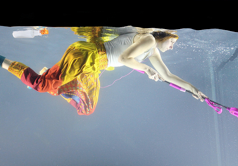
|
»Rethinking boundary objects from the arts perspective: strange objects as a critical approach to transdisciplinary projects«
Ramon Sangüesa
Transdisciplinary projects involving the arts and other disciplines, have found some difficulties that are common to a wide range of cooperative efforts. There are numerous insights, guidelines and principles resulting from years of research on cooperation and collaboration in system science, group dynamics, network science, complexity, innovation, design, management, knowledge management, organizational design and organizational aesthetics. There is plenty of evidence and advice on the inherently difficult task that exploring together the unexplored is.
more
|
|
|
DISCIPLINARITIES.
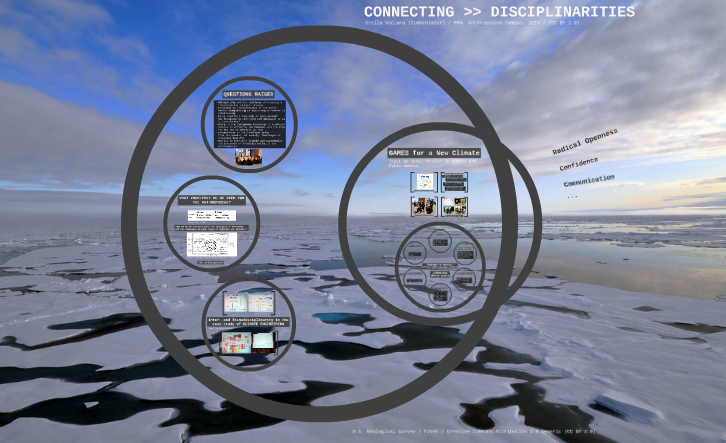 |
»Anthropocene Campus«.
Stella Veciana
Transdisciplinary practice confronts us with methodological challenges. We need shared spaces to discuss new methodologies of integration; especially methodologies that integrate academic and practical knowledge are fundamental. Besides the challenges that result out of the transdisciplinary practice itself, there are also the institutional ones related to the lack of a necessary research framework for science and civil society, a corresponding curriculum, research agenda and funding programs. During the Anthropocene Campus new experiences and methodologies, were presented and discussed to contribute to foster a transdisciplinary ‘work in progress’ Anthropocene curriculum.
more
|
|
|


|
»Mobile Festivals«
Philip Baharlou, Nikolai Huckle, Yannik Leusch, David Nacke, Luca Weege
How can the Good Life be shared in our city? The student group mapped accurately the urban space, which they had explored and recorded during their dérive. An entertaining video presentation proofs the under-used sports facilities and public parks that they had discovered through direct observation. This evidence was complemented with national statistics regarding sports facilities, and low support for local artists and musicians. The presentation gives a rich journey through their research problem, a transition approach to Buen Vivir related to urban commons, the expected positive social impact of revaluing unused public sports facilities, a proposal for future research, and the presentation of their mobile mini-festival project to revive these “lost spaces” of Lüneburg. more
This contribution arose from the seminar "GoodLife_RealLAB – Connecting Potatoes, DJ-Practice, and Transition Research", which was held at the Leuphana University, Lüneburg during the SS 2014.
»Time Sharing« Maximilian Buhr, Katharina Domsch, Joana Klemz, Sarah Schmidt, Jennie Schüttler, Franziska Trenkler, Katharina vom Dahl
How can we find a way out of consumption? How could we possibly share our time differently than endlessly consuming stuff? The student group developed a large body of evidence from direct observation and interviews during their dérive through Lüneburg. These are summarized in a short video presentation combined with performative elements such as raising text banners to emphasize conclusions. Their work includs artistic interventions in the city as a means of investigation and analysis of the city, and to generate and test a solution to the problem itself, which was to develop the way, or route out of consumption by good quality living. The expected social impact would address a change in consciousness and by sharing time in the community. more
This contribution arose from the seminar "GoodLife_RealLAB – Connecting Potatoes, DJ-Practice, and Transition Research", which was held at the Leuphana University, Lüneburg during the SS 2014. |
|
|
|

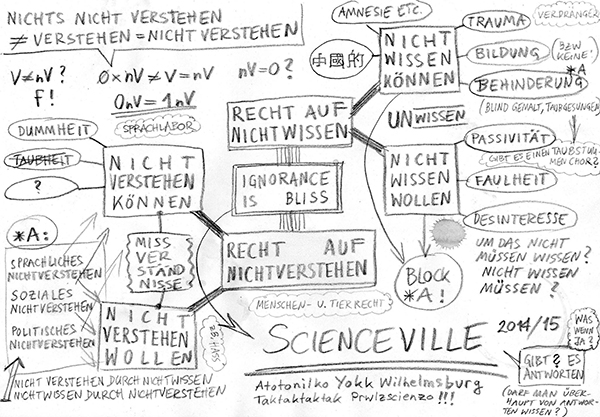
|
»K L A N G S P O R T. A transdisciplinary research approach to an acoustically-performative exploration of (indoor) sports.« Marina Sahnwaldt
The starting point of this journey is a space between sports and movement: the ambient noise of (indoor) sports. The synergies resulting from the combination of sports and music, have a wide range of trans-disciplinary approaches to research and application areas. The various stages of this expedition unfold an exciting field of experimentation and a wide scope for creation, both in practical artistic as well as inthe theoretical discourse. The results of the journey established a new format: KLANGSPORT. more
This contribution arose from the seminar "Research arts - Research at the interface of art, science and technology", which was held at the Leuphana University, Lüneburg in WS/2013-14.
»Kunst und Wissenschaft. Wo Felder kollidieren - Scienceville, Santral und die Hybrid Plattform.« Annika Hintz
The interaction of art and science has expanded increasingly, especially since the last decade: inter-and transdisciplinary projects, conferences, seminars, lectures, and publications can be reported all over. They have made ??it their task to illuminate and identify interactions and convergences of disciplines, commonly perceived as disparate. Art and Science "collide" in multiple projects that have an impact beyond the university. A selection of current spaces of collaboration between art and science are presented that encourage participation. more
This contribution arose from the seminar "Research arts - Research at the interface of art, science and technology", which was held at the Leuphana University, Lüneburg in WS/2013-14.
|
|
|
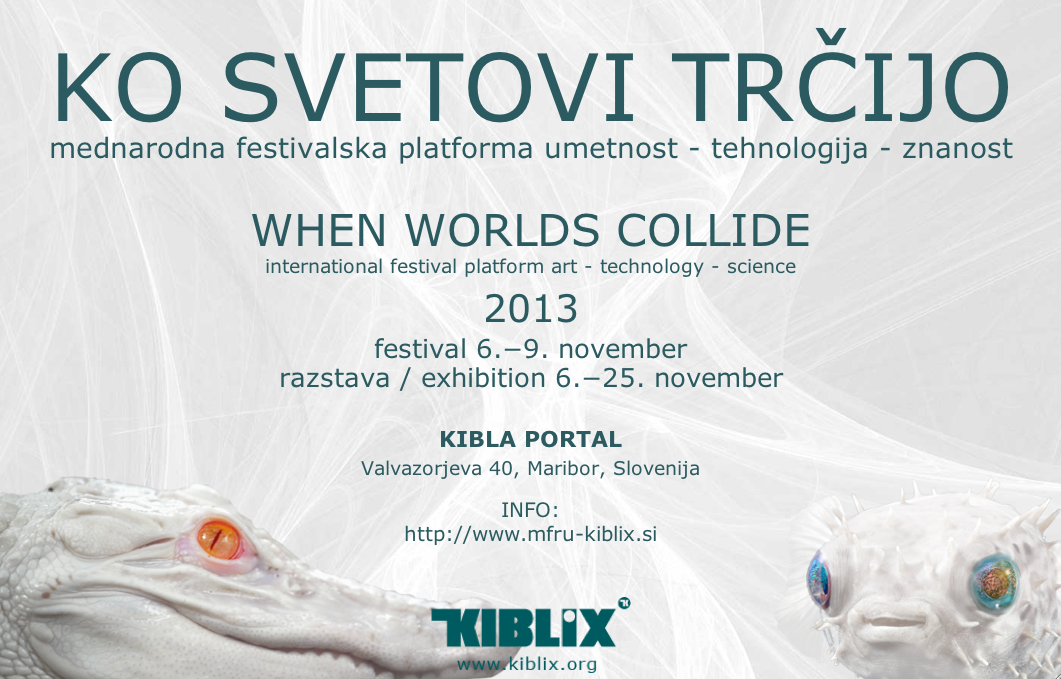
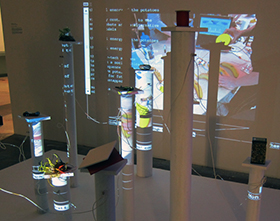
|
»KIBLIX – CELEBRATE TOMORROW! The history of KIBLIX Art Science Technology Festival«.
Dejan Pestotnik.
Since 2002 Association for Culture and Education (ACE) KIBLA, Maribor, Slovenia is gradually transforming the international, technically oriented open code event platform KIBLIX into a domain of celebration of art & science & technology ith the strong focus on education, hands-on creation, collaboration and sharing of knowledge. more
»Reflections on MRFU-KIBLIX2013 Kooperation«.
Tanja Grosman.
The task how to go beyond the complexity of questions raised at Kiblix 2012 in the year of the European Capital Of Culture Maribor 2012 was not easy. How to go beyond? How to represent relevant up-to-date content raising awareness, informing, educating, developing non-formal conceptions as “Workshopology” - and in a strictly open coded way? The solution was found joining forces with the MRFU (eng.: International Festival of Computor Arts IFCA). more
From RAABLAB online interfaces to local offline cooperation: the interdisciplinary REVALUING MEMORY workshops at Kiblix Festival«.
Stella Veciana and Dan Norton.
The REVALUING MEMORY workshops are a developing series of workshops bringing together artists and scientists to explore interaction techniques for connected art practice. The workshop at the »Kiblix Art Science Technology Festival« was based around research practices represented by objects and the simple creative behaviours of selecting and mixing to build connectivity: from object art to connected art. more »KARTOFFELKONZERT AUF PIEZO-BEEPER. A reflection on artistic practice.«
Tomaž Grušovnik. more |
|

|
»The Textimage ERANOS DIALOG«.
Christiane ten Hoevel and Stella Veciana.
The article presents the ERANOS DIALOG as a stimulating dialogue format for the development of inter / transdisciplinary projects. Eranos in ancient Greece was originally a friends’ banquet where everyone contributed food. In a figurative sense, today Eranos is a mental feast, where the guests share, for example, a speech, a song, a drawing or their openness to improvise at joint talks and discussions. Out of the shared experience of the ERANOS DIALOGUE, Christiane ten Hoevel and Stella Veciana developed together an experimental »text image«.
more |
|
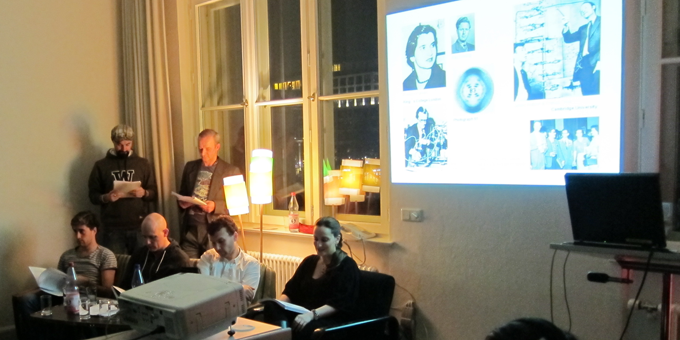
|
»New contents and forms of scientific communication: the Science & Theatre project«. Prof. Regine Hengge.
Science & Theatre is a trans-disciplinary project at the cross-roads between natural sciences and art. Project partners are the microbiologist Prof. Regine Hengge from the Institute of Biology at the Free University of Berlin, and the theatre and artistic director of the English Theatre Berlin, Günther Grosser. Science & Theatre introduces young scientists to the social and ethical aspects of science, prepares them for their future responsibilities as science communicators, explores the theater stage as a new form of scientific communication, and develops new and current contents for the contemporary theatre in Germany within the context of ‘Science Plays’. Science & Theatre views itself as a social laboratory where the conditions and opportunities for creativity and communication are examined as a long-term transdisciplinary project. (German) more |
|
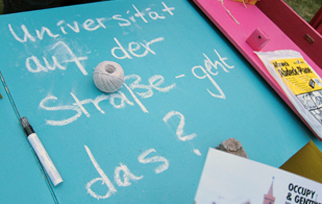
|
»Low-tech« versus »high-tech« cooperation: the politically charged potatoes of Víctor Grippo and the controversial BMW Guggenheim Lab Berlin.
Stella Veciana.
In the seventies, the Argentine chemist and artist Victor Grippo developed a number of »low-tech experiments« using potatoes as an energy crop. With the choice of potatoes, he questioned the underlying social, political, historical, scientific and technological contexts of his energy-related experiments. Today the issues and »low-tech models« he raised are still relevant, especially regarding how international research cooperation between industrialized, emerging and developing countries should function. more |
|
|